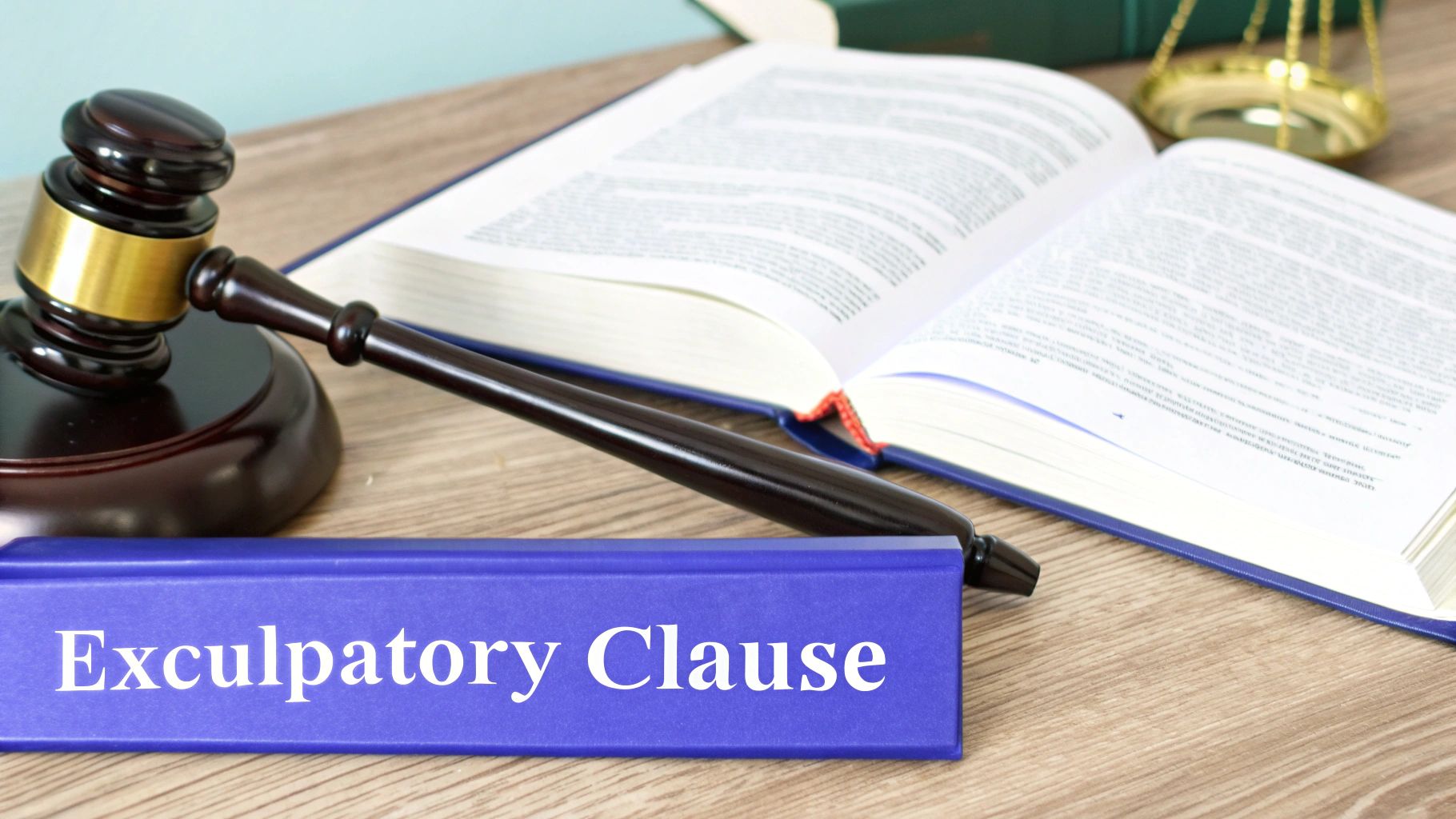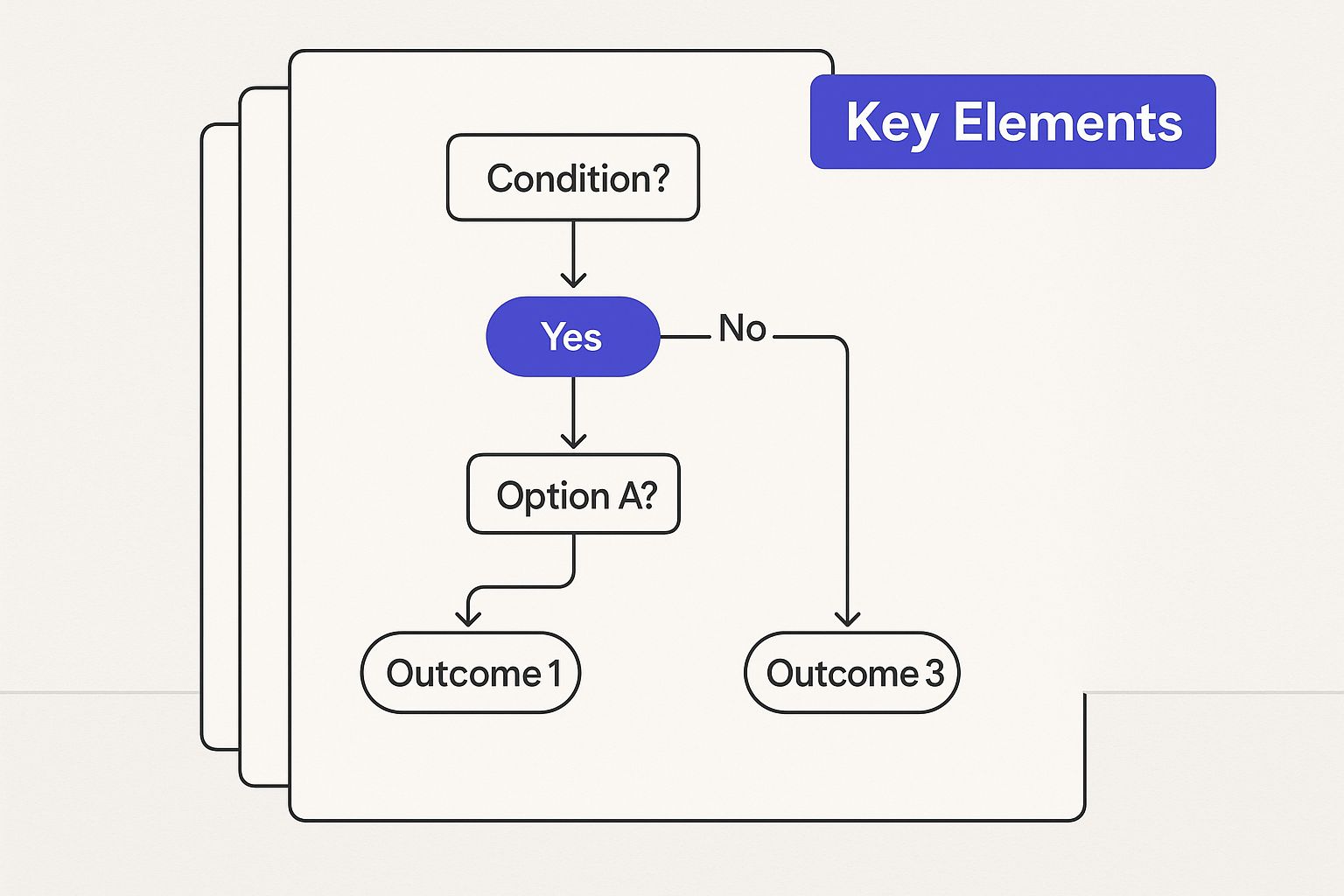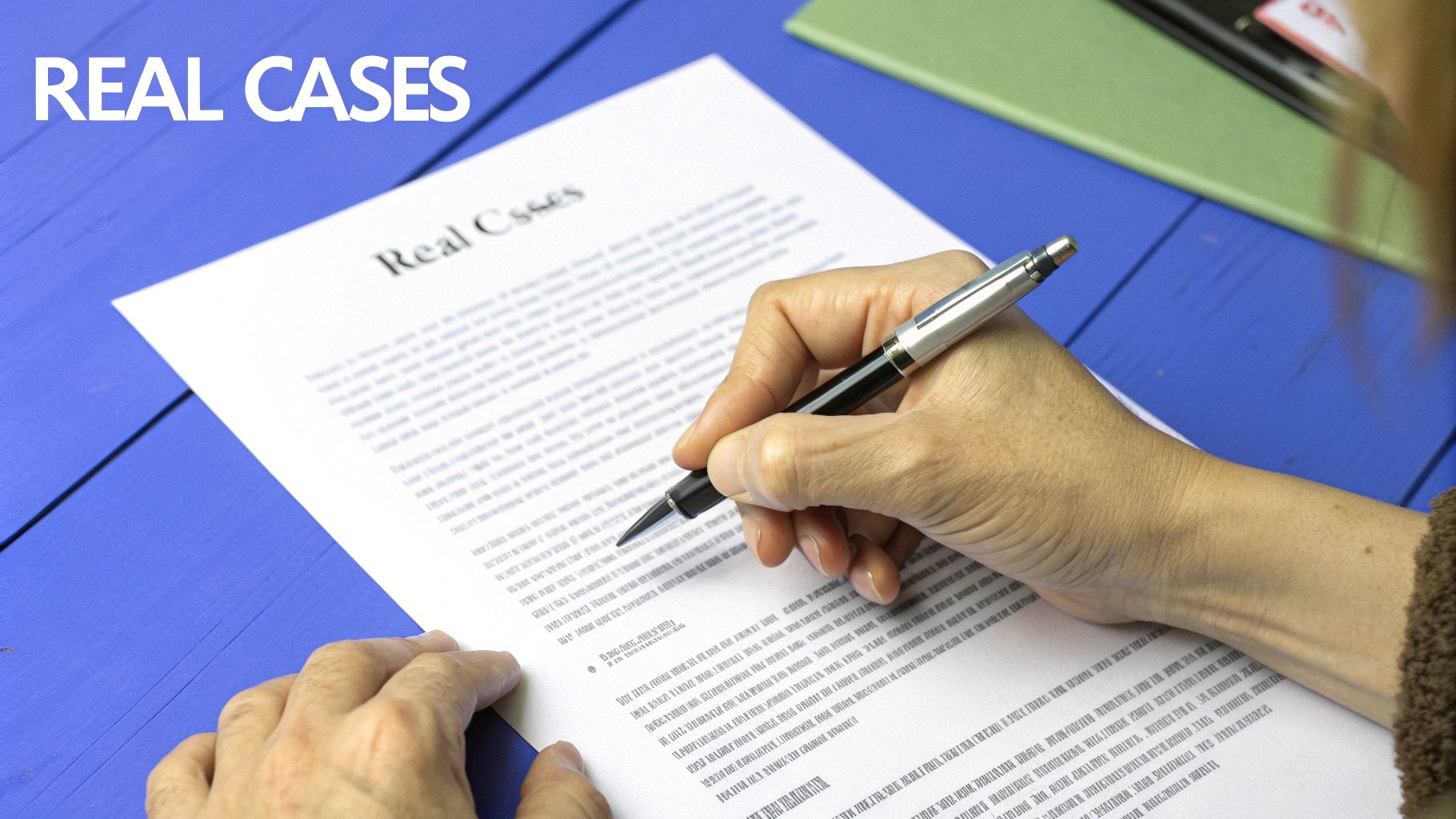
An exculpatory clause is a fancy legal term for a pretty simple idea: it's a part of a contract that tries to free one party from being blamed—and sued—if something goes wrong.
Think of it as a "get out of jail free" card, but for civil liability. It's a pre-agreed deal where you essentially waive your right to sue someone for damages that might happen while the contract is in effect.
Breaking Down the Liability Shield

Let's use a real-world example. Ever signed up for a gym membership, a ski pass, or a ticket to a trampoline park? You probably skimmed right past a bunch of text before signing. Buried in that fine print was almost certainly an exculpatory clause.
That lengthy paragraph is where you agree not to hold the business responsible if you happen to get injured. By signing, you're acknowledging the inherent risks and agreeing upfront not to sue them for ordinary negligence.
At their core, these clauses are all about allocating risk. It’s one party’s way of saying, “Hey, you’re participating in this activity, and by doing so, you accept that things could go wrong. You agree not to hold us liable if they do.”
Core Purpose and Function
The main goal here is pretty blunt: to stop lawsuits before they even start. By getting your signature on an agreement with this clause, a business is building a legal wall to block you from seeking money for injuries or other damages.
They are incredibly common in everyday agreements, from real estate contracts and event tickets to equipment rentals.
An exculpatory clause is a proactive defense. It's a private agreement where both sides decide to change the standard rules of legal liability before anything bad happens.
To really get a handle on why businesses use them, it helps to see them as just one piece of the broader concept of risk management. Companies are always looking for ways to limit their financial exposure, and these clauses are a powerful tool in their arsenal.
For anyone signing a contract, spotting these clauses is step one. Understanding what they actually mean for you is the crucial next step. If you want to dig deeper into the specifics, you can learn more about what an exculpatory clause is and its various forms in our other guides.
To make things even clearer, here's a quick breakdown of the essential components of an exculpatory clause.
Exculpatory Clause Key Concepts at a Glance
| Concept | Simple Explanation | Common Example |
|---|---|---|
| Liability Waiver | A formal agreement where one party gives up the right to sue another. | Signing a waiver before participating in a marathon or a mud run. |
| Risk Allocation | Deciding in advance who will bear the financial burden if something goes wrong. | A software company stating they are not liable for data loss from bugs. |
| Negligence Shield | Protects a party from being sued for carelessness (ordinary negligence). | A parking garage ticket stating they aren't responsible for vehicle damage. |
| Enforceability | Whether a court will actually uphold the clause if it's challenged. | A clause trying to waive liability for intentional harm is usually unenforceable. |
This table gives you a snapshot of what these clauses are designed to do. While they can be a useful tool for businesses, their power isn't unlimited—courts often scrutinize them to ensure they are fair and don't violate public policy.
How These Clauses Work in Everyday Situations
Chances are, you’ve agreed to an exculpatory clause dozens of times without even realizing it. These liability shields aren't just for dense corporate contracts; they're woven into the fabric of many daily activities, quietly working in the background whenever you do something that has some built-in risk.
Think about the last time you signed up for a gym. Buried in that paperwork, there was almost certainly a paragraph stating the gym is not responsible for any injuries you might get while using the equipment. That’s a classic exculpatory clause.
By signing, you’re acknowledging the obvious risks—like dropping a weight or tripping on a treadmill—and agreeing not to sue the gym if an ordinary accident happens. That simple signature effectively transfers the financial risk of a mishap from the business to you.
From the Ski Slopes to Your Software
This risk-shifting mechanic pops up all over the place, especially in recreational services where the potential for injury is a known factor.
- Renting a Kayak: The rental form will have language releasing the company from liability if you capsize or get hurt on the water.
- Visiting a Trampoline Park: That waiver you have to sign is one big exculpatory agreement, protecting the park from claims for sprains, fractures, and other common injuries.
- Buying a Ski Pass: The terms and conditions will absolve the resort of responsibility for accidents out on the slopes.
These clauses are a go-to for businesses dealing with property and are deeply connected to premises liability law. They are the primary tool for managing the risks that come with inviting the public to use their facilities and equipment. The goal is simple: head off lawsuits that might arise from the predictable hazards of the activity itself.
By accepting the terms, you’re basically telling the business, "I get that there are risks here, and I agree to take responsibility for my own safety when it comes to ordinary accidents."
This idea isn't just limited to physical activities; it’s all over the digital world, too. When you install new software or sign up for an online service, the long "Terms of Service" you click "I Agree" to is packed with them. A common one is a clause saying the company isn’t liable for data loss or business disruptions caused by a software bug.
In every scenario, the setup is the same: one party (the business) shields itself from legal action, and the other party (you) accepts the risks that come with the territory. Understanding this dynamic is key, as it shows how an exculpatory clause reassigns responsibility before anything ever goes wrong.
When Can an Exculpatory Clause Be Enforced?
Just because an exculpatory clause is tucked into a contract doesn’t make it an unbreakable shield. Their power is far from absolute, and courts often put them under a microscope to make sure they aren’t being used to unfairly sidestep responsibility. Enforceability is never a given—it all comes down to a delicate legal balancing act.
When a court reviews a liability waiver, it’s essentially asking a few key questions: Is this agreement fair? Is it written clearly? And does it align with the public’s best interest? This scrutiny prevents powerful organizations from using dense legal text to wash their hands of all responsibility, especially when it comes to essential services or outright negligence.
The infographic below breaks down the key elements a court will weigh when deciding if a clause holds up.

As you can see, getting an exculpatory clause enforced means clearing several hurdles. From the clarity of the language to its impact on public policy, each factor represents a potential point of failure if the clause is ever challenged.
The Clarity and Conspicuousness Test
First things first: the clause must be written in crystal-clear language and be easy to spot. Courts are naturally skeptical of liability waivers buried in the fine print or loaded with convoluted legal jargon that the average person couldn't possibly be expected to understand.
For an exculpatory clause to even have a fighting chance in court, it has to be:
- Unambiguous: The text needs to spell out exactly what types of liability are being waived. Vague phrasing like "any and all claims" might not hold up if it isn't specific.
- Conspicuous: The clause should stand out from the rest of the text. This is often done by using a larger font, bold text, or putting it under a clear heading like "Waiver of Liability."
If a clause is hidden or confusing, a court is likely to rule that the person who signed it didn't actually consent to its terms, making it completely unenforceable.
Assessing Fairness and Bargaining Power
Courts also zoom out and look at the context of the agreement itself. Was this a fair negotiation between two equal parties? Or was it a "take-it-or-leave-it" deal where one side held all the cards? This is what’s known as evaluating the bargaining power of the parties involved.
When an essential service is on the line—think medical care or housing—courts are far less likely to enforce an exculpatory clause. The reasoning is simple: public policy dictates that people shouldn't have to sign away their fundamental rights just to get services they desperately need.
It’s also important to remember that the rules for enforceability can vary wildly from one state to another, reflecting different judicial philosophies and public policies. Some jurisdictions, for instance, are particularly tough on broad clauses in contracts where there was no real opportunity to negotiate. You can dig deeper into how these legal standards differ from state to state on ExpertInstitute.com.
Ultimately, a court has to weigh the freedom people have to enter into contracts against the need to protect individuals from exploitation and harm. If a clause is deemed overly broad, unclear, or just plain contrary to the public good, it will almost certainly be thrown out.
Spotting Exculpatory Clauses in Real Contracts
Knowing the theory is one thing, but can you spot an exculpatory clause in the wild? These liability-shifting paragraphs often hide in plain sight, tucked away in the dense legal text of documents you sign every day. To sharpen your contract review skills, let's break down a few common examples and pinpoint the exact language that moves risk from their column to yours.
Once you know what to look for, these clauses are much less intimidating. They almost always use specific legal phrases like "hold harmless," "release from liability," or "assume all risk."
The Recreational Activity Waiver
This is probably the most common place you'll run into one. Think about signing up for a rock-climbing gym, a ski pass, or even a local 5k race. The waiver they have you sign is basically one giant exculpatory agreement, all designed to protect the business from lawsuits if you get hurt.
The language usually looks something like this:
"By signing this document, the participant hereby agrees to release, waive, and hold harmless the climbing gym, its owners, employees, and agents from any and all claims, demands, or causes of action arising out of or related to any loss, damage, or injury, including death, that may be sustained by the participant while on the premises or participating in any climbing activities, whether caused by the negligence of the releasees or otherwise."
That key phrase—"negligence of the releasees"—is the real kicker. This is where you agree not to sue the gym even if your injury was their fault, like if they failed to properly inspect a climbing hold. By signing, you're explicitly taking personal responsibility for those risks.
The Residential Lease Agreement
Exculpatory clauses pop up all the time in real estate leases, usually to limit a landlord's liability for anything that happens in common areas. Landlords use these to shield themselves from accidents they can't directly control.
Here’s a real-world example of what this looks like in a lease:
This screenshot shows a clause that limits the landlord's responsibility for injuries in shared spaces like pools, gyms, or parking lots. The property owner is basically trying to prevent tenants from filing a claim for something like a slip-and-fall near the swimming pool. The responsibility, or onus, is shifted to the tenant to be careful.
The Business to Business Service Agreement
In a B2B context, these clauses are critical for managing risk between two companies. For example, a tech company that provides cloud storage will almost certainly include a clause to limit its liability if your data gets lost or corrupted.
- Service Provider's Goal: Protect themselves from massive financial lawsuits if a server crashes or data is wiped out.
- Client's Risk: You could lose essential business data with no way to get compensation.
A clause in a B2B tech contract might read:
"The service provider shall not be liable for any loss of data, loss of profits, or any indirect, incidental, or consequential damages arising from the use or inability to use the service, even if the provider has been advised of the possibility of such damages. The client agrees that the provider's total liability shall not exceed the amount paid by the client for the services in the preceding three (3) months."
This one does two things. It not only waives liability for certain types of damages, but it also caps the total financial payout—a very common move in business contracts. Recognizing this language is crucial for understanding exactly what financial risks you're taking on when you sign.
Understanding What These Clauses Cannot Protect

While an exculpatory clause can be a solid shield against lawsuits over everyday accidents, that protection isn't bulletproof. Courts draw a hard line when a party's behavior crosses from simple carelessness into something far more serious. This legal shield shatters when it comes up against actions that are exceptionally reckless or intentionally harmful.
Think of it this way: an exculpatory clause might protect a ski resort if you fall on a well-maintained slope. That's an inherent risk. But it almost certainly won't protect them if an employee knowingly sends you down a closed run with a known avalanche risk.
The legal system simply won't enforce an agreement that gives someone a free pass for severe misconduct. It's a matter of public policy—no contract should become a license to act recklessly without consequences.
Gross Negligence: A Higher Level of Carelessness
The most common reason a court will toss out an exculpatory clause is gross negligence. This isn't just a simple mistake or a momentary lapse in judgment. It's a conscious and voluntary disregard for the need to use reasonable care, showing a level of carelessness so extreme it borders on indifference to the safety of others.
Here’s a practical way to see the difference:
- Ordinary Negligence: A coffee shop employee forgets to put out a "wet floor" sign right after mopping up a small spill.
- Gross Negligence: The coffee shop owner knows the espresso machine has a major electrical fault that shocks baristas but does nothing to fix it for weeks.
In that second scenario, the owner’s inaction shows a blatant disregard for a known, serious danger. A court is highly unlikely to let an exculpatory clause excuse that kind of behavior. This concept is related to but distinct from a limitation of liability clause, which aims to cap the amount of damages rather than eliminate liability altogether.
Actions That Void Liability Waivers
Beyond gross negligence, a few other actions will almost always render an exculpatory clause invalid. These clauses are not designed to be a get-out-of-jail-free card for malicious or illegal behavior. A business cannot contract away its responsibility for certain fundamental duties.
A liability waiver is meant to cover foreseeable accidents inherent to an activity, not to excuse a blatant disregard for safety or the law.
The following actions typically fall well outside the protection of any exculpatory clause:
- Intentional Harm: Deliberately causing an injury or damage to someone.
- Reckless Conduct: Acting with a complete and utter disregard for a known and unjustifiable risk.
- Violations of Law: Causing harm while breaking a specific safety law or public regulation.
Getting a complete picture of liability also means looking at how a business is set up. For a deeper dive into this, an expert guide on different business liability structures offers great context on how risk is managed from the ground up.
What to Do When You Encounter an Exculpatory Clause
So, you've spotted an exculpatory clause in a contract. What now? Your first instinct should be to hit the brakes. Before you sign anything, it's time to slow down and really dig into what you're being asked to agree to.
Don't let the dense legal language throw you off. If a sentence makes your eyes glaze over, that’s a red flag. Ask for a simple, plain-English explanation. Any reputable business should be happy to clarify exactly what risks they expect you to take on. This is all about making sure you walk in with your eyes wide open.
Key Actions to Take
Your main job here is to figure out the scope of the waiver. Is it just asking you to accept the normal, inherent risks of an activity? Or is it a sweeping, overly broad clause trying to protect the company from its own carelessness? That's a huge difference.
Here are a few practical steps to take:
- Read Every Word: Keep an eye out for headings like "Waiver of Liability," "Assumption of Risk," or "Hold Harmless." That's usually where these clauses hide.
- Ask for Clarification: If the wording feels vague, don't be shy. Ask for specific, real-world examples of what the clause is meant to cover.
- Assess the Risks: Think realistically about what could go wrong. The potential for harm at a trampoline park is obviously very different from the risks baked into a commercial lease.
Remember, signing a contract is supposed to be a voluntary act. If you feel like you're being unfairly cornered or pressured into signing, that could actually affect the agreement's validity. It's worth understanding your rights, as this can sometimes wade into the territory of duress in contracts.
Negotiation and Legal Counsel
While some of these clauses are presented as take-it-or-leave-it (think concert tickets), many are surprisingly negotiable. This is especially true in B2B agreements, commercial leases, or service contracts.
You can push back. Suggest changes that narrow the scope, like limiting the waiver to cover only ordinary negligence instead of gross negligence.
For any contract involving a lot of money or a high degree of personal risk, getting legal advice is non-negotiable. An attorney can tell you if the clause would even hold up in your state and help you negotiate better terms. The goal is to make sure you don't accidentally sign away critical rights without fully grasping the consequences.
Common Questions About Exculpatory Clauses
Diving into legal contracts can feel like learning a new language. To make things a bit clearer, here are some straightforward answers to the questions we hear most often about exculpatory clauses and how they actually work.
What’s the Difference Between an Exculpatory Clause and an Indemnification Clause?
While both of these clauses are about managing risk, they work in opposite ways. An exculpatory clause is all about prevention—it’s a proactive step where one party agrees not to sue the other for potential future screw-ups. The goal is to stop a lawsuit before it even starts.
An indemnification clause, on the other hand, is reactive. It doesn't prevent a lawsuit. Instead, it sorts out who foots the bill after the fact. It basically says that if a third party sues you, the other person in the contract has to cover your legal fees and any financial damages.
Here's a simple way to think about it: An exculpatory clause says, "You agree you won't sue me if something goes wrong." An indemnification clause says, "If someone else sues you because of this, I'll pay your legal bills."
Can I Actually Negotiate an Exculpatory Clause?
Absolutely. While you probably can’t negotiate the fine print on a concert ticket, many other contracts are fair game—especially in B2B agreements or commercial leases. You have the power to push back.
For example, you could ask to limit the clause's power so it only covers ordinary negligence but specifically leaves out gross negligence. Don’t be afraid to ask for changes that better protect you. The worst they can do is say no.
Do These Clauses Hold Up in Personal Injury Cases?
You see them all the time, especially in waivers for things like gyms, ski resorts, or escape rooms. But when it comes to personal injury, courts look at these clauses under a microscope. Their biggest concerns are whether the clause was clear, fair, and doesn't go against the public good.
A court might uphold a clause for a minor injury from a predictable risk—like twisting your ankle on a treadmill. But if you were injured because the gym owner knew a machine was dangerously broken and did nothing about it (gross negligence), the clause would almost certainly be thrown out. The level of carelessness from the provider makes all the difference.
Trying to make sense of dense legal contracts is tough. Legal Document Simplifier uses AI to instantly translate complicated agreements into simple summaries. It points out key terms, risks, and your obligations so you can sign with total confidence. Learn more and see how it works at https://legaldocumentsimplifier.com.